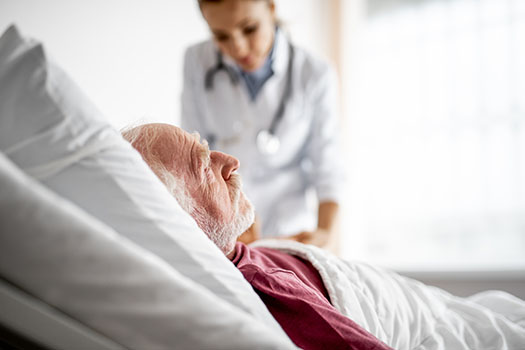It’s not unusual for seniors to get readmitted to the hospital shortly after they were discharged. There are a number of factors responsible for readmissions, some of which may be preventable. Here are some common diagnoses that lead to hospital readmissions.
Urinary Tract Infection
If your aging loved one had an indwelling catheter while in the hospital, he or she may have contracted a urinary tract infection. Because symptoms of a urinary tract infection can take a couple of days to develop, your loved one may not become symptomatic until after he or she has been discharged from the hospital. As the urinary tract infection progresses, your loved one may experience bladder pain, urinary frequency and burning, blood in the urine, fever, chills, and back pain. These symptoms can be severe and may warrant a hospital readmission for intravenous antibiotic treatment. If a urinary tract infection isn’t recognized and treated promptly, permanent renal damage or sepsis, a serious blood infection, may occur.
A professional caregiver can closely monitor your loved one for post-hospitalization complications. When searching for reliable homecare service agencies, families want to know their senior loved one will be well taken care of. At Home Care Assistance, our expertly trained caregivers are available around the clock to assist with tasks around the house, provide transportation to medical appointments and social events, and much more.
Upper Respiratory Infection
Hospital-acquired infections such as those of the respiratory tract can send your loved one back into the hospital soon after being discharged. Like hospital-acquired urinary tract infections, respiratory infections contracted in the hospital may not become symptomatic until after seniors have gone home. If your loved one develops a productive cough, fever, shortness of breath, or body aches, a respiratory infection may be present and should be treated quickly. If antibiotics fail to resolve the infection, your loved one may wind up back in the hospital.
Hip Fracture
Falls and hip fractures are common after hospital discharge. Weakness, muscle atrophy, and side effects from new medications prescribed in the hospital can lead to balance problems and dizziness after discharge, raising the risk for falls. If your loved one breaks a hip at home, he or she will need to be transported to the hospital immediately. A hip fracture requires surgery to repair the joint, and afterward, your loved one will need to participate in a physical therapy program. Occupational therapy may also be recommended to further promote the healing process.
Many aging adults need assistance when they return home after being hospitalized. Some seniors only require help with a few daily tasks so they can maintain their independence. However, those living with serious illnesses may need more extensive assistance. Luckily, there is professional live-in care Anchorage, AK, seniors can rely on. Home can be a safer and more comfortable place for your loved one to live with the help of an expertly trained and dedicated live-in caregiver.
Deconditioning
If your loved one was discharged after a lengthy hospital stay, he or she may experience deconditioning, which refers to a decrease in physical or psychological function. Prolonged immobility, bed rest, and inactivity can affect every system in the body. If deconditioning has affected your loved one’s cardiovascular system, he or she may be readmitted to the hospital as a result of low blood pressure, cardiac output deficits, and activity intolerance. If deconditioning affected the lungs, your loved one may be readmitted because of shortness of breath, lung collapse, and difficulty breathing, both at rest and during activity. Other problems related to deconditioning that may lead to a hospital readmission include muscle atrophy and contractures, both of which can raise the risk for falls.
A professional caregiver can be a wonderful source of support for a senior who’s recovering after being hospitalized. Anchorage senior home care experts are available to provide high-quality care to seniors on an as-needed basis. From assistance with mobility and exercise to providing transportation to the doctor’s office and social events, there are a variety of ways professional caregivers can help your aging loved one continue to live independently. To hire a dedicated caregiver, call Home Care Assistance at (907) 770-0907 today.
